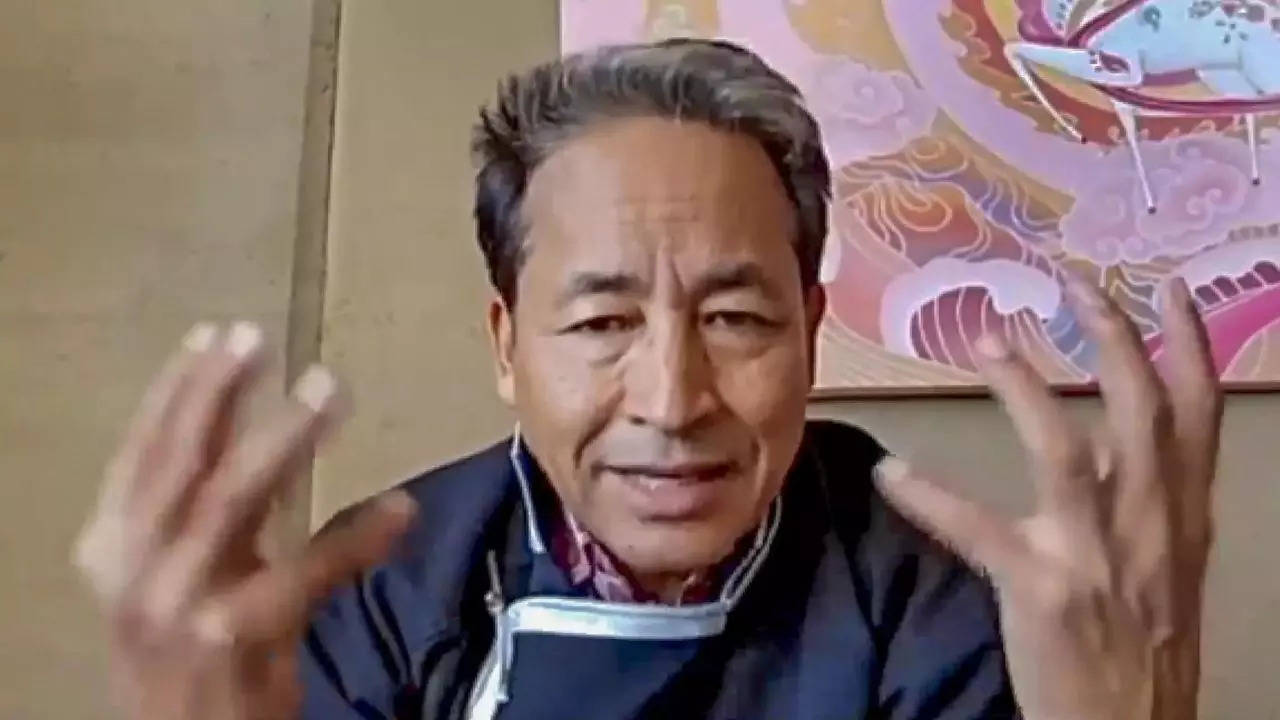NEW DELHI: Educationist and climate activist Sonam Wangchuk on Sunday announced that if the government fails to invite them for discussions, they will restart another 28-day fast on August 15 for Ladakh statehood.
Wangchuk said the Apex Body, Leh (ABL), and the Kargil Democratic Alliance (KDA) had presented a list of demands to Prime Minister Narendra Modi during his visit to Dras last week, on the occasion of 25th anniversary of the Kargil Vijay Diwas.
“We did not want to push the government too much during the elections; we were hopeful that the new government would take some concrete steps. If they do not heed our request, if they do not call us for talks, we will launch another round of protest from August 15,”: Wangchuk told news agency PTI.
Earlier this year, in March, Wangchuk went on a 21-day fast, consuming only salt and water, to advocate for Ladakh’s statehood and its inclusion under the Sixth Schedule of the Constitution. His primary concern was to safeguard the ecologically sensitive region from the exploitation of “greedy” industries. The Ladakhi students held protests in Delhi, Pune and Nagpur. Despite assurances of dialogue from Centre, there have been multiple protests in parts of Ladakh.
Why were Ladakhis on the streets?
J&K and Ladakh were declared two separate UTs following the abrogation of Article 370 in August 2019. Soon after the euphoria of having an identity separate from J&K had died, Ladakhi people realised that creation of a UT left them without a legislature, depriving them of autonomy in governance. There are also concerns of adequate representation in govt jobs and land rights. In addition, Kargil, which is predominantly Sunni Muslim, was unhappy to be lumped with Buddhist- dominated Leh.
What are they demanding?
Ladakhis believe their interests will only be protected if they have full statehood. They have also demanded tribal area status under the Sixth Schedule of Article 244 of the Constitution that will provide for establishing autonomous district councils (ADC) in Ladakh and Kargil.
ADCs will have the power to impose taxes and make laws in areas such as village administration and forest management, while staving off industrial and mining giants in this ecologically-sensitive region.
Wangchuk said the Apex Body, Leh (ABL), and the Kargil Democratic Alliance (KDA) had presented a list of demands to Prime Minister Narendra Modi during his visit to Dras last week, on the occasion of 25th anniversary of the Kargil Vijay Diwas.
“We did not want to push the government too much during the elections; we were hopeful that the new government would take some concrete steps. If they do not heed our request, if they do not call us for talks, we will launch another round of protest from August 15,”: Wangchuk told news agency PTI.
Earlier this year, in March, Wangchuk went on a 21-day fast, consuming only salt and water, to advocate for Ladakh’s statehood and its inclusion under the Sixth Schedule of the Constitution. His primary concern was to safeguard the ecologically sensitive region from the exploitation of “greedy” industries. The Ladakhi students held protests in Delhi, Pune and Nagpur. Despite assurances of dialogue from Centre, there have been multiple protests in parts of Ladakh.
Why were Ladakhis on the streets?
J&K and Ladakh were declared two separate UTs following the abrogation of Article 370 in August 2019. Soon after the euphoria of having an identity separate from J&K had died, Ladakhi people realised that creation of a UT left them without a legislature, depriving them of autonomy in governance. There are also concerns of adequate representation in govt jobs and land rights. In addition, Kargil, which is predominantly Sunni Muslim, was unhappy to be lumped with Buddhist- dominated Leh.
What are they demanding?
Ladakhis believe their interests will only be protected if they have full statehood. They have also demanded tribal area status under the Sixth Schedule of Article 244 of the Constitution that will provide for establishing autonomous district councils (ADC) in Ladakh and Kargil.
ADCs will have the power to impose taxes and make laws in areas such as village administration and forest management, while staving off industrial and mining giants in this ecologically-sensitive region.
